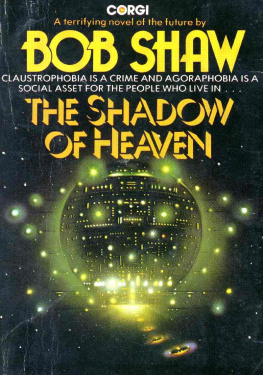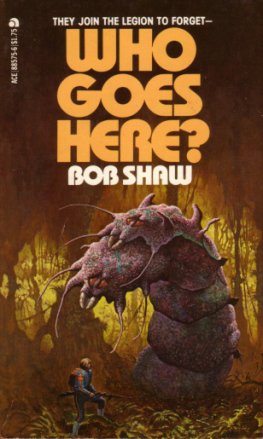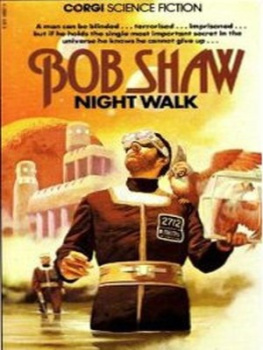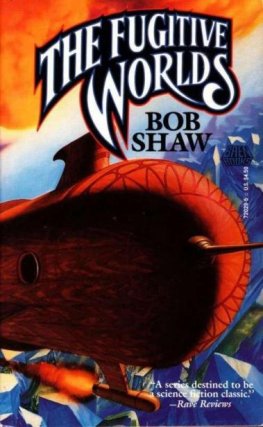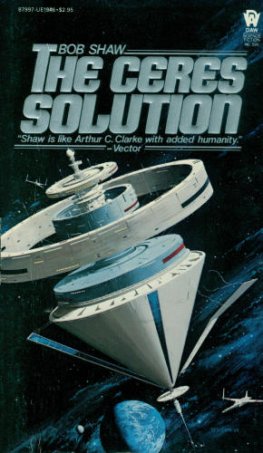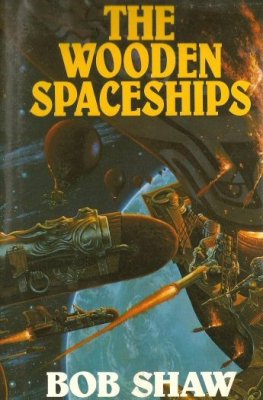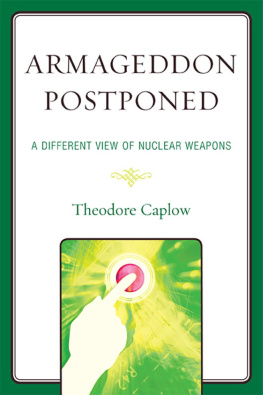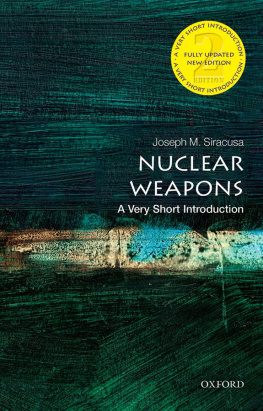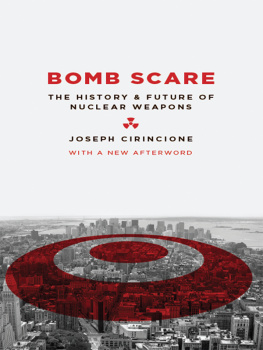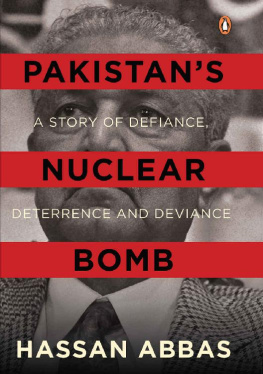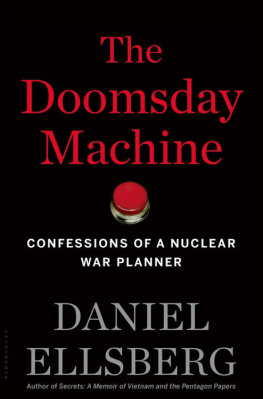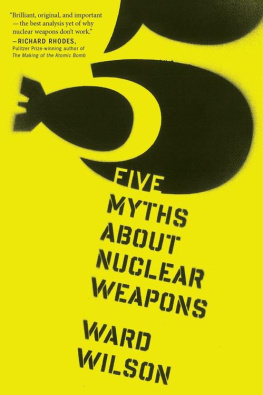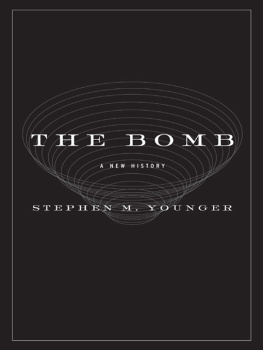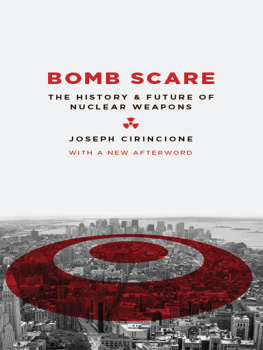THE PEACE MACHINE
by Bob Shaw
My finger rests lightly on the black button.
The street beyond this window looks quiet, but I am not deceived for my death lies out there, waiting. I had thought myself prepared to face it, yet now a strange timidity grips me. Having surrendered all claim to life, I am still reluctant to die. The only parallel to this mood in my experience is that of a man whose marriage is failing (of such things I can sneak with some authority) but who lacks the nerve or energy for adultery. He eyes another woman squarely, with all the boldness he can muster, and inwardly he begs her to take the first step for, in spite of his yearnings, he cannot. In this way then, I confront the sergeant whose arrest is so strict; in this way I hesitate on the threshold of one of deaths ten thousand doors.
My finger rests lightly on the black button.
The sky, too, looks peaceful, but I wonder. Up there in that vault of wind-scoured pewter an aircraft may be preparing to unburden itself of a man-made sun; at this exact second a missile may be penetrating the upper atmosphere amid a cloud of decoys and slow-tumbling rocket casings. That way, the whole town would go with me, but my conscience can sustain the weight of seventy thousand deaths as long as there is time to carry out the vow before the fireball comes billowing and spreading.
As long as I press the black buttons.
My left arm hangs limp, and blood trickles warmly downward across the palm of that hand, tempting me to close the fingers, to try holding on to life. I can find no bullet hole in the material of my sleeve the fibres appear to have closed over it as do a birds feathers which seems strange, but what do I know of such things?
How did I, Lucas Hutchman, an undistinguished mathematician, come to be in this situation?
It should be instructive to consider the events of the past few weeks, but Im tired and must be careful not to relax too much.
I must be prepared to press the black button
Hutchman lifted the squared sheet from his desk, looked at it, and felt something very strange happen to his face.
Starting at the hairline, an icy sensation moved downward in a slow wave over his forehead, cheeks, and chin. The skin in the region of the wave prickled painfully as he felt each pore open and close in an insubstantial progression, like wind patterns on a field of grain. He put a hand to his forehead and found it slippery, dewed with chill perspiration.
A cold sweat, he thought, his shocked mind seizing gratefully on the irrelevant. You really can break into a cold sweat and I thought it was just a figure of speech.
He mopped his face and then stood up, feeling strangely weak. The squared sheet on the desk reflected sunlight up at him, seeming to glow malevolently. He stared at the close-packed strings of figures he had put there, and his consciousness ricocheted away from what they represented. What unimpressive handwriting! In some places the figures are three, four times bigger than in others. Surely that must show lack of character.
Vague colours mauve and saffron drifted beyond the frosted-glass partition which separated him from his secretary. He snatched the rectangle of paper and crammed it into his jacket pocket, but the area of colour was moving toward the corridor, not coming his way. Hutchman opened the connecting door and peered through at Muriel Burnley. She had the cautious, prissy face of a village postmistress, and an incongruously voluptuous figure which was nothing but a source of embarrassment to her.
Are you going out? Hutchman said the first words that came into his head, meanwhile looking unhappily around her office which was too small, and choked with olive-green filing cabinets. The travel posters and plants with which Muriel had decorated it served only to increase the atmosphere of claustrophobia. She glanced with resentful perplexity at her right hand on the knob of the outer door, at the coffee cup and foil-wrapped chocolate bar in her left hand, and at the clock which registered 10:30 the time at which she always took her break with another secretary along the corridor. She did not speak.
I just wanted to know if Dons in this morning, Hutchman extemporized. Don Spain was a cost accountant who had the office on the opposite side of Muriels and shared her services.
Him! Muriels face was scornful behind the tinted prescription lenses the exact colour of antique-brown glass which screened her eyes from the world. He wont be in for another half-hour this is Thursday.
What happens on Thursday?
This is the day he works at his other job. Muriel spoke with heavy patience.
Oh! Hutchman recalled that Spain made up the payroll for a small bakery on the far side of town as a sideline and usually handed his work in on Thursdays. Having outside employment was, as Muriel frequently pointed out, a breach of company regulations, but the main cause of her anger was that Spain often gave her letters to type on behalf of the bakery. All right, then. You run along and have your coffee.
I was going to, Muriel assured him, closing the door firmly behind her.
Hutchman went back into his own office and took the sheet of figures from his pocket. He held it by one corner above the metal waste bin and ignited it with his bulky desk cigarette lighter. The paper had begun to burn reluctantly, with a surprising amount of acrid smoke, when the door to Muriels office was opened. Shades of gray moved on the frosted glass, the blurred mask of a face looking his way. Hutchman dropped the paper, stamped it out, and crammed it back into his pocket in one frantic movement. A second later Spain looked into the office, grinning his conspiratorial grin.
Ho there, Hutch, he said huskily, Howre you getting on?
Not bad. Hutchman was flustered and aware he was showing it. Not badly, I mean.
Spains grin widened as he sensed he was on to something. He was a short, balding, untidy man with slate-gray jowls and an almost pathological desire to know everything possible about the private lives of his colleagues. His preference was for material of a scandalous nature, but failing that any kind of information was almost equally acceptable. Over the years Hutchman had developed a fascinated dread of the little man and his patient, ferretting methods.
Anybody asking about me this morning? Spain came right into the office.
Not that I know of. Youre safe for another week.
Spain recognized the gibe about his outside work and his eyes locked knowingly with Hutchmans for an instant. Suddenly Hutchman felt contaminated, wished he had not made the reference which somehow had associated him with Spains activities.
Whats the smell in here? Spains face appeared concerned. Something on fire?
The waste bin was smouldering. I threw a butt into it.
Spains eyes shone with gleeful disbelief. Did you, Hutch? Did you? You might have burned the whole factory down.
Hutchman shrugged, picked up a file from his desk, and began studying its contents. It was a summary of performance data from a test firing of a pair of Jack-and-Jill missiles. He had already abstracted as much information as he required from it, but he hoped Spain would take the hint and leave.
Were you watching television last night? Spain said, his throaty voice slurring with pleasure.
Cant remember. Hutchman shuffled graph papers determinedly.
Did you see that blond bit on the Mort Walters show? The one thats supposed to be a singer?
No. Hutchman was fairly sure he had seen the girl in question, but he had no desire to get involved in a conversation in any case, his viewing time had been brief. He had glanced up from a book and noticed an unusually pneumatic female figure on the screen, then Vicky had walked into the room and switched the set off. Accusation and disgust had spread like Arctic ice across her features. He had waited all evening for an explosion, but this time she seemed to be burning on a slow fuse.


